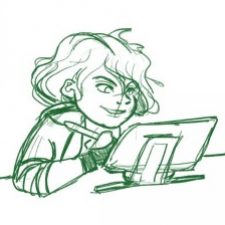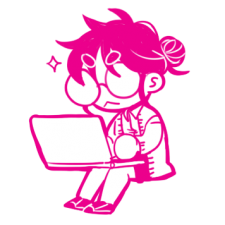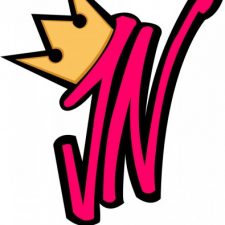Discussion:
You must be logged in to reply to this topic.
- WEEK 9 Freaking Out
-
March 19, 2020 at 4:18 pm #58708

Sara Gómez WoolleyParticipantHello Class,
I’d like us all to read this article to get us back on track with our work our goals and our creative centers at this difficult time.
Creative Inspiration Freaking Out
By Patrick LaMontagneIt Begins…
Are you freaking out? So am I.
Over the past few days, I’ve been worrying about how this situation will turn out badly for me in the long run, both for my syndicated editorial cartoons and my licensed paintings.
Yes, that’s selfish.
We’re all in the same boat, dealing with this. We can still be empathetic while focusing on our own needs. Just like they say in that pre-flight briefing nobody listens to: Secure your own oxygen mask first.
What do you think about Patrick LaMontagne’s perspective? Are there ideas he puts forward you find resonating?
He puts forward the following question:
“How long will this last? That’s the big question.
But another question worth asking, what if this is an opportunity?”
What do you think about this?
-
This topic was modified 4 years, 9 months ago by
 Sara Gómez Woolley.
Sara Gómez Woolley.
March 22, 2020 at 5:54 pm #58882
Julie BradfordParticipantAll announcements since that Wednesday that CUNY & SUNY colleges started the distance-learning model, I freaked out real bad. Not for me, but for my family. I was in the “all bad” state of mind wondering when my dad would get the call that he’s being let go or that my mom can no longer proceed with her at-home attendant work. Even mundane things like waiting for my dental insurance approval to kick in was freaking me out and making me think it was never going to happen. Then I thought of my actual job, how many clients needed to cancel upcoming and on-going events and activities. My world felt like it was in a perpetual toilet flush.
LaMontagne has the right sense, where even though everything is just spiraling, you need to take time and just BREATHE. Don’t overwork yourself, because then you’ll just burn out. Nothing is AS BAD as we make it seem in our head. And so, since this past Friday, things started looking up. From my family coming back safe and sound from their emergency trip to visit my sister in Daytona Beach (she’s a banker and will still be getting paid!), to my dad receiving a message from his work stating that their company has been deemed essential under a new NYS law and that work will continue UNINTERRUPTED and ON SCHEDULE, and finally back to ME! I will also still be getting paid and be able to help the family!
Patrick’s point about utilizing the time we have been given is what I am now taking advantage of. I use my planner more than ever now and while my time isn’t meticulously planned, I have blocks during the day dedicated to class projects/work work/personal work.
Like Patrick said, the world still turns, time will keep rolling by. It’s how we adapt to the situation that keeps us going with it.
On further note, all this has taught the design team as my job more about adaptability and has given us a new platform from which to build on. It’s a work-in-progress how we will be proceeding, but its something!
March 22, 2020 at 6:33 pm #58887
Rachel KimParticipantThe Long Distance Illustrator:
It was interesting to hear different people’s perspective on their stance as an artist. There were a couple of things that stood out to me, such as drawing “fanart”, unintentionally touching upon a political topic, where their stance/purpose was as an illustrator or their views on connecting an artist’s behavior with their art. Those are some of my biggest concerns and insecurities about posting my art, so hearing their opinion about those topics oddly comforted me.This particular segment was specifically for those who drew fanart, but I’ve noticed while they were talking about drawing fanart, they agreed that adding fanart to your portfolio was a good idea because it shows that you can replicate the likeness of a character with your style and it’ll shine more brightly because the piece was something that you were passionate about. They also spoke about how there was a sense of shame that came along with the term, and I agree wholeheartedly. I believe that my interest clearly shows in my artwork, but when I compare drawing a class project that I’m not entirely interested in verses creating a fanart that I’m excited about, the latter will be a more successful piece.
Freaking Out:
At the beginning of this article, I started to feel stressed. I don’t know if it has to do with empathy, but reading all of Patrick LaMontagne’s thoughts gave my body a bad squeeze. Not because I relate to his mind, but because I don’t. I’m not on his level, and it’s unfair to compare myself to him because he has years and experience under his belt, but that’s what froze time for me. The what-ifs.But near the end of the article, to me, although it spins the anxiety to a positive light of well, what if we can get our anxiety to push ourselves to work harder and open new doors. I think that it’s possible to use your fears to your advantage, but right now, at the moment, I feel a bit skeptical about it. Which I think is another interesting topic of its own, how what people are currently feeling will push them into a certain mindset and direction. Right now, I don’t feel too confident and I’m anxious and worried about the future, but maybe in a couple of days, even a couple of hours, I could be in a different mindset, and I feel like that made me a little more hopeful. That this current mood I’m feeling won’t last forever. It’ll come and go, but not sticking to me.
March 22, 2020 at 6:36 pm #58889
jasonParticipantDuring the podcast “Episode 4: The Long Distance Illustrator” what caught my attention was the end part when Jen Bartel was saying that once you create something, post it already, don’t be afraid that somebody would take your work. Be the first to post it in and other words what she is saying, don’t wait too long because of the fear. This is really stood out to me because when I take photo of something amazing, I would be afraid to post it right away due to others probably already have an exact same photo. From what she said, it made me realized that I shouldn’t be afraid of the photo I have taken, that everyone has their way and unique photo that they capture.
Reading the article about “Freaking Out” by Patrick LaMontagne, he asked a question about what if this is an opportunity ? My personally opinion, I would say yes and no. I say yes because as a photographer I can be able to go out and take pictures of how empty the city is because of the virus. However, I also say no because I don’t want to be thinking doing that due to people actually dying from the virus and how it can affect a whole family. I personally feel stressed because everything is crippled up and pressure.
-
This reply was modified 4 years, 9 months ago by
 jason.
jason.
March 22, 2020 at 6:44 pm #58892
jasonParticipant@rkim2395
At your comment about feeling anxious and worried about the future is exactly how I feel. After the virus news came all out, I just on edge trying to figure what I’m going to do right now, what I’m going to do in the future. How long will this virus be here until we find a vaccine? It’s just a lot of things to think of as of right now.March 22, 2020 at 6:45 pm #58893
Rachel KimParticipant@jnavarro Yeah, I feel that about that part of the podcast too. I’m super scared of posting my work, but not necessarily cause it’ll get stolen (well, maybe just a little), but I’m just scared of upsetting someone with my content.
@rkim2395 Its ok to upset people. Don’t be afraid to ruffle a few feathers with your informed opinions. You are smart and capable and your voice deserves to be heard. This is how culture changes. The best work is usually risky work.-
This reply was modified 4 years, 9 months ago by
 Sara Gómez Woolley.
Sara Gómez Woolley.
March 22, 2020 at 6:51 pm #58897
Julie BradfordParticipant@rkim2395 For the first few days since the world exploded, I didn’t do SHID. I had my sketchbook and supplies out in front of me and nu-uh. I just kept pressing “play next” on Brooklyn 99 and refreshing the CNN site. It wasn’t until Jen Bartel’s live stream one night that I finally felt inspired to do some sketches. I love Bartel to death and it’s just fate she had me working again.
-
This reply was modified 4 years, 9 months ago by
 Julie Bradford.
Julie Bradford.
March 22, 2020 at 6:58 pm #58900
Savannah HendricksonParticipantFor the current situation that we’re in, it’s really hard to not think about the worst-case scenarios because we’re panicking. I know that I, for one, have a lot of questions regarding this situation. I tend to ask, “How long is this going to last for?”, “Do we really know a lot about this virus?”, “Is there anything about this situation the media is not telling us?” Needless to say, I always think about the worst-case scenarios.
From Patrick LaMontagne’s perspective, these things would happen. However, it wouldn’t be the worst case scenario. He even states that the worst thing in his mind happened in the end, and according to him, it went smoothly. If anything, Patrick was worrying less about the situation of the virus and more about how this situation is going to affect his creative work. While he says it’s “selfish”, I believe it’s a valid thing to worry about as an artist because our works might be put on hold.
When Patrick asked, “What is this is an opportunity?”, I believe he was referring to using your art as a voice. Perhaps you want to share something regarding the situation. Maybe it’s about how we are all in this together, or a reminder to keep yourself and others safe. Whatever it is, it would be an opportunity for artists to contribute to the world by using their art.
Patrick gave a reminder that you can keep work on your art, but you mustn’t overdo it. There’s only so much work that you can do. Burn out is a real thing, and it’s going to happen rather quickly if you over exert yourself. We just need to to a break, and breathe. Especially during this situation where people are panicking, we gave to stop for a minute, breathe, and relax. If we can all do this, it would be a lot easier.
March 22, 2020 at 7:01 pm #58901
jasonParticipant@jbradford
I agree with you on part that we will be adaptable to the situation at hand and also learn new things. I learned how online classes feel, its a little hard to to keep on track with so much emails but once you get the hand of it then it becomes straight forward.March 22, 2020 at 7:29 pm #58902
Savannah HendricksonParticipantIn the beginning of The Long Distance Illustrator podcast, the one topic that caught my attention was about political views and taking a stance as an artist. I honestly don’t illustrate anything regarding politics or current events because I’m slightly afraid what others would think. They might think that I’m sending out the wrong message. Jen Bartel said that it’s a matter of being careful about what you put out there and maintaining professionalism. According to her, being more vocal is what’s getting her more jobs. I do believe that it is important to take a stance as an artist, especially now during this pandemic. I’m trying to get over the fear of what others would think and be more vocal in my illustrations.
March 22, 2020 at 7:51 pm #58903
Julie BradfordParticipant@jnavarro In a way, this new standard will help us with our future work, when handling long-distance communication and business with clients. It def has a learning curve, but we got this!
March 22, 2020 at 8:04 pm #58904
Julie BradfordParticipantI didn’t pay attention to the special guests at first, or else I would have listen to this days ago. Jen Bartel is MY GIRL. I have admired her art for ages and look up to her as an aspiring cover artist myself. Her work just punches you in the face with color at every turn and it’s delightful!
What I enjoyed most about this podcast was how a lot of their topics centered around social media, mainly twitter, as being the forefront in our current days as illustrators and for communication, not just for luring in prospective clients but getting to know fans/artistic heroes/etc. They had mentioned that we can only know so much about an artist through their art, but once they start getting vocal on a platform such as twitter, you can start catching glimpses, if not the whole, of who they are. Jen, for example, is big on certain issues, such as our current political climate. She mentioned in the podcast that while she knows she has to maintain a certain professionalism, there are “hills she is willing to die on”. And fans resonate with that, myself included! While artists should be careful what they put out there, it’s also a bright side that they could attract work based on their views as well.
Their discussion on success was also an eye opener. We are taught that to be successful, you should be the “creme de la creme” in your field and that you’re nothing if you haven’t drawn a certain character or worked for a certain company. Jen explains that while she doesn’t consider herself successful, she acknowledges that she has had and done good work. Nico notes that happiness with your work is a form of success. Just work with what makes you happy! And from a business standpoint, note what about your work you are good at and keep doing that.
March 22, 2020 at 8:12 pm #58905
Julie BradfordParticipant@shendrickson I’m also fearful of how others would feel on political work if I were to put it out there, but it’s all about believing in the message and adding your name to the fight.
March 22, 2020 at 8:28 pm #58906
Lance WebleyParticipantWhat stood out for me from the “long distance illustrator” podcast is when artists Jen Bartel and Nico Delort was talking about fan art. Delort said “that you should put fan art into your portfolio because it’ll bring your voice in that story. Plus, you’ll have fun doing it and the best art you’ll create is the one you have fun with”. Bartel added on to this by saying “one way to gain visibility with people that can potentially hire you is to create work that will create traction.” I barely made any fan art myself because I didn’t think it can be stronger than your original work and original was always better. But, after hearing what Bartel and Delort has said my perspective on fan art has changed and I’ll do more of it. I always focused on original work and blocked out doing fan art. Even when I have the urge to do fan art, I just didn’t follow through with it.
When I read “Freaking Out” by Patrick LaMontagne I completely understood what he was going through. Catastrophizing thinking is what I was feeling before the pandemic because I was working 20+ hours a week and taking 5 classes at the same time. There was a lot of stress from class projects, lack of sleep, work, and doing things outside of work/school. I was falling behind, and I was struggling to catch up. I was literally having thoughts of failing classes. Now during the pandemic, I have mixed feelings. This is where the polarizing thinking/thoughts starts to kick in. I’m out of work. So, now I can focus on schoolwork, which is good, but now the problem is that I don’t have a steady income. I got to be careful on how I spend my money. Staying at home is great, but I’m a bit lazier at home due to not having the best workspace. I don’t mind going outside to get things I need, but if I catch the COVID virus it’ll be worse for me because I have asthma. My biggest concern is that we don’t know if this will end in a good way or have a worse outcome.
March 23, 2020 at 2:57 pm #59024
Sara Gómez WoolleyParticipantJulie –
I certainly relate. I think we were even on the same freak out schedule. It was the CUNY closure that made the emergency really sink in for me.
My concerns, similar to yours were for my family, especially for my mom. I’m very glad to hear that your family is doing well and your concerns for their financial well being and your own are lessened.The end of the article, on finding opportunity in this is what really resonated with me.
-
This topic was modified 4 years, 9 months ago by
You must be logged in to reply to this topic.


